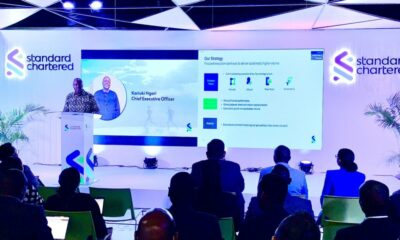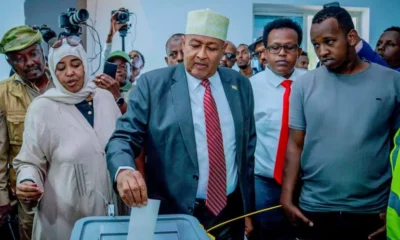Business & Money
Meet Kariuki Ngari: Standard Chartered Bank’s new CEO of Africa. What’s Next?
Kariuki Ngari’s nomination heralds a new chapter and an entire volume in the bank’s narrative of success in Africa. It signifies a renewed sense of purpose, a reaffirmation of values, and a shared commitment to shaping a brighter future for the continent’s economies and communities.
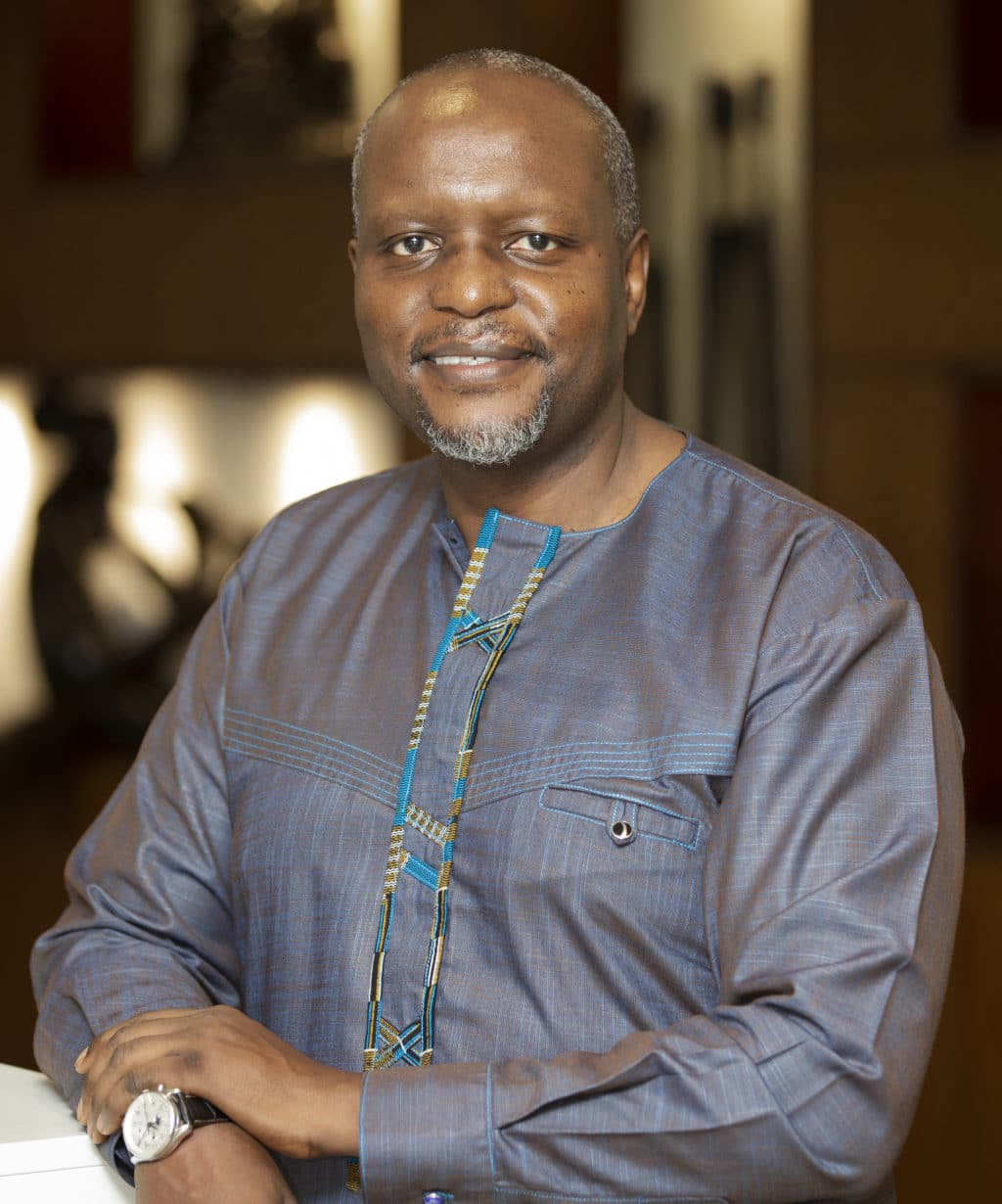
: The nomination speaks volumes about the bank’s commitment to its African operations and its strategic vision for growth on the continent.
: Kariuki’s vast experience and market insight make him a catalyst for growth. With his strategic vision, Standard Chartered can seize opportunities, expand, and provide tailored financial solutions
By Charles Wachira
In a significant move within the banking sector, Kariuki Ngari ascended to CEO Africa at Standard Chartered Bank on April 3, marking a pivotal moment in his illustrious career. As he steps into this new role, Ngari faces a landscape rife with challenges but brimming with opportunities. He is poised to leverage his expertise and track record to propel the bank’s growth trajectory across Africa.
Challenges and Opportunities:
Navigating Regulatory Complexity: One of Kariuki’s foremost challenges will be navigating the diverse regulatory environments across the African continent. With each country presenting unique regulations and compliance requirements, Ngari must adopt a nuanced approach to ensure Standard Chartered Bank’s operations remain compliant while driving growth.
Adapting to Market Dynamics: African markets are diverse and constantly changing. Rapid shifts in consumer preferences, technological advancements, and intense competition characterise them. Kariuki must stay agile and adaptive, seizing opportunities for innovation and market expansion while mitigating risks associated with changing market dynamics.
Fostering Financial Inclusion: Africa offers significant opportunities for financial inclusion, as a large portion of the population remains underserved by traditional banking services. Kariuki has the opportunity to drive initiatives that promote financial literacy, expand access to banking services, and foster inclusive economic growth across the continent.
Previous Achievements and Experience:
Before assuming the role of CEO of Africa, Kariuki served in various leadership positions within Standard Chartered Bank, demonstrating his exceptional leadership capabilities and strategic vision. Some of his notable achievements include:
Driving Digital Transformation: Kariuki played a pivotal role in driving Standard Chartered Bank’s digital transformation agenda, spearheading initiatives to enhance the bank’s digital capabilities and customer experience. Under his leadership, the bank successfully launched innovative digital banking solutions tailored to the African market, driving customer engagement and retention.
Expanding Market Presence: Kariuk has a proven track record of expanding Standard Chartered Bank’s market presence across Africa, identifying growth opportunities, and forging strategic partnerships to penetrate new markets and strengthen the bank’s foothold in existing ones.
Promoting Sustainable Finance: Kariuki is committed to promoting sustainable finance and responsible banking practices. He has championed initiatives focused on environmental, social, and governance (ESG) principles, integrating sustainability into the bank’s business strategy and operations.
Expectations in the New Role:
As CEO of Africa, stakeholders expect Kariuki to bring his wealth of experience, strategic acumen, and unwavering commitment to driving Standard Chartered Bank’s growth agenda in Africa. Key expectations include:
Strategic Vision: Kariuki will continue articulating a clear vision for Standard Chartered Bank’s African operations, leveraging market insights and industry trends to identify growth opportunities and drive sustainable value creation.
Innovation and Digitalization: Ngari will prioritise innovation and digitalisation, harnessing the power of technology to enhance the bank’s offerings, streamline operations, and deliver superior customer experiences.
Stakeholder Engagement: Ngari will intensely focus on stakeholder engagement, fostering relationships with clients, regulators, shareholders, and communities to ensure alignment with the bank’s objectives and values.
The nomination of Kariuki to the position of CEO of Standard Chartered Africa speaks volumes about the bank’s commitment to its African operations and its strategic vision for growth on the continent. Here are a few critical points that the nomination signifies:
Recognition of Talent: Standard Chartered Bank’s decision to appoint Kariuki Ngari as CEO of Africa reflects the bank’s recognition of his exceptional leadership qualities, strategic acumen, and track record of success within the organisation. It indicates that the bank values talent from within its ranks and is committed to nurturing and promoting internal talent to key leadership positions.
Focus on the African Market: By appointing a CEO specifically for the African region, Standard Chartered Bank underscores the importance of the African market in its global strategy. It signifies the bank’s commitment to unlocking the vast opportunities presented by the African continent and leveraging its potential for growth and expansion.
Continuity and Stability: Kariuki’s nomination brings continuity and stability to Standard Chartered Bank’s African operations. With his deep understanding of market dynamics, extensive experience within the organisation, and proven track record of success, Ngari is well-positioned to provide steady leadership and drive the bank’s growth agenda in Africa.
Emphasis on Local Leadership: The appointment of Kariuki, who is of Kenyan nationality, also highlights the importance of local leadership and expertise in driving success in the African market. It demonstrates Standard Chartered Bank’s commitment to fostering a diverse and inclusive leadership culture that reflects the communities and markets it serves.
Strategic Direction: Kariuki’s nomination signifies the bank’s strategic direction and priorities for its African operations. It suggests a focus on driving innovation, digital transformation, and sustainable growth in key markets across the continent, with Ngari leading the charge in executing the bank’s vision and objectives in Africa.
Kariuki’s appointment as CEO of Africa at Standard Chartered Bank marks a significant milestone in the institution’s journey towards consolidating its position as a premier financial institution on the African continent. With an unwavering focus on excellence, strategic foresight, and a proven track record of leadership, Kariuki brings a wealth of experience and expertise that positions him as a catalyst for transformative growth.
His elevation underscores the bank’s confidence in his abilities and its steadfast commitment to fostering homegrown talent and leveraging local expertise to drive success in key markets. Kariuki’s appointment represents more than just a change in leadership; it symbolises a new era of innovation, resilience, and adaptability in navigating the intricacies of the African financial landscape.
In the face of evolving market dynamics, regulatory complexities, and competitive pressures, Kariuki’s leadership will be instrumental in steering Standard Chartered Bank towards sustainable growth and value creation. His strategic vision, coupled with a deep understanding of the African market, will enable the bank to capitalise on emerging opportunities, expand its footprint, and deliver superior financial solutions tailored to the diverse needs of its customers.
Moreover, Kariuki’s appointment reinforces Standard Chartered Bank’s commitment to driving positive impact and fostering inclusive growth across the continent. Kariuki is poised to make a meaningful difference in millions of individuals and businesses across Africa by championing initiatives promoting financial inclusion, sustainability, and responsible banking practices.
In essence, Kariuki’s nomination heralds not just a new chapter but an entire volume in the bank’s narrative of success in Africa. It signifies a renewed sense of purpose, a reaffirmation of values, and a shared commitment to shaping a brighter future for the continent’s economies and communities. As he assumes the mantle of leadership, Ngari stands at the forefront of Standard Chartered Bank’s journey towards becoming the partner of choice for businesses, investors, and individuals alike, propelling Africa towards a future of prosperity and opportunity.
Keywords:Kariuki Ngari:Standard Chartered Bank:CEO Africa:Financial Inclusion:Digital Transformation
Business & Money
KCB Group Surpasses Equity with US$ 342.31 Million Nine-Month Profit
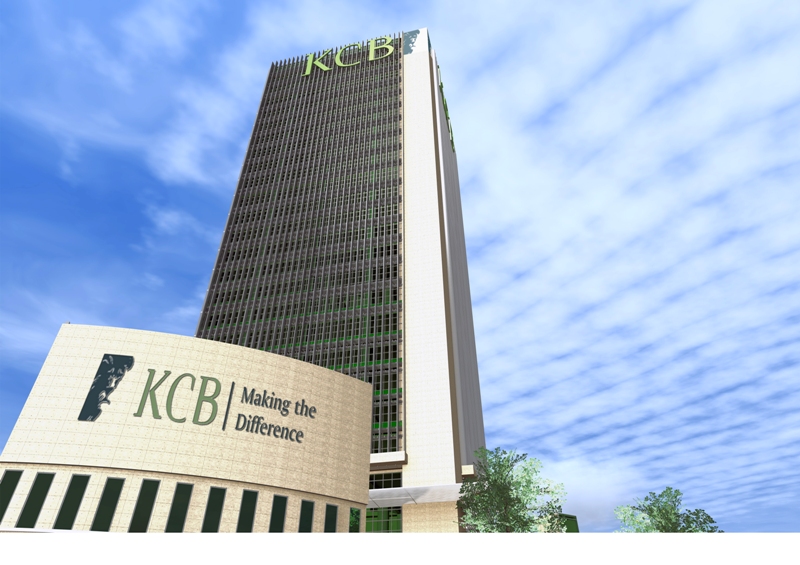
: KCB Group reports Sh44.5B ( US$ 342.31) nine-month profit, outpacing
Equity Bank. Learn about its 49% growth, challenges, and stock performance this
year.
KCB Group Plc has outperformed Equity Bank to cement its position as Kenya’s leading
lender, posting a net profit of Sh44.5 billion for the nine months ending September
This represents a 49% year-on-year growth, surpassing Equity Bank’s Sh37.5
billion profit during the same period.
Profit Growth Driven by Core Business Performance
The remarkable profit growth was fueled by higher earnings from both interest and non-
interest income streams. KCB’s diverse revenue base has been pivotal in maintaining
its dominance in the competitive banking sector.
Non-Performing Loans a Key Concern
Despite the impressive profit growth, KCB’s non-performing loan (NPL) ratio rose to
18.5%, compared to 16.5% last year. This increase highlights persistent challenges in
managing credit risk, with Chief Financial Officer Lawrence Kimathi acknowledging it as
a “pain point” for the bank.
KCB Stock Outshines Peers on NSE
KCB’s strong financial performance has translated into exceptional stock market results.
The bank’s stock has risen 78.8% year-to-date, making it the best-performing banking
stock on the Nairobi Securities Exchange (NSE).
Plans to Sell National Bank of Kenya
Earlier this year, KCB announced plans to sell its struggling subsidiary, National Bank of
Kenya (NBK), to Nigeria’s Access Bank. While Nigerian regulators have approved the
deal, it is still awaiting clearance from Kenya’s Central Bank. The sale aims to
streamline KCB’s operations and address losses at NBK.
CEO Paul Russo Optimistic About Year-End Performance
“The journey has not been without its hurdles, but our ability to walk alongside our
customers has driven our success,” said KCB CEO Paul Russo. He expressed
confidence in closing the year on a high note, leveraging improving economic conditions
across the region.
Key Figures at a Glance
● Net Profit: Sh44.5 billion (+49%)
● Non-Performing Loan Ratio: 18.5% (up from 16.5%)
● Stock Performance: +78.8% year-to-date
KCB’s strong performance underscores its resilience in navigating challenges and its
commitment to sustaining growth in Kenya’s banking sector.
Business & Money
Top 10 Kenyan banks by total assets as of 2023, based on data from the Central Bank of Kenya:
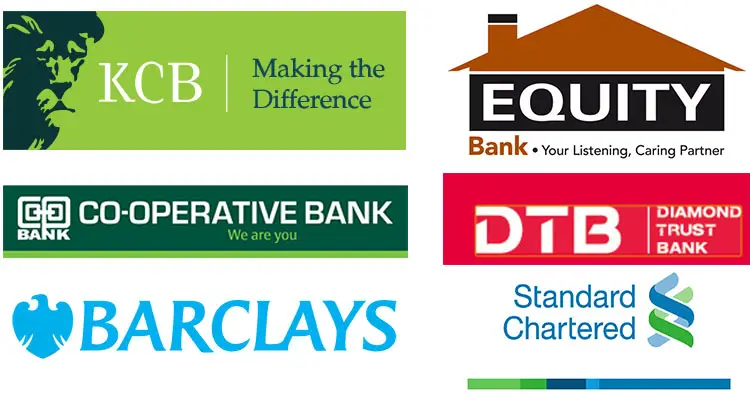
KCB Bank Kenya Limited
Total Assets: KSh 1.425 trillion
Market Share: 17.4%
Equity Bank Kenya Limited
Total Assets: KSh 1.004 trillion
Market Share: 12.2%
NCBA Bank Kenya PLC
Total Assets: KSh 661.7 billion
Market Share: 9.2%
Co-operative Bank of Kenya
Total Assets: KSh 624.3 billion
Market Share: 8.8%
Absa Bank Kenya PLC
Total Assets: KSh 520.3 billion
Market Share: 6.6%
Standard Chartered Bank Kenya
Total Assets: KSh 429.3 billion
Market Share: 5.9%
Stanbic Bank Kenya
Total Assets: KSh 449.6 billion
Market Share: 5.8%
I&M Bank Limited
Total Assets: KSh 405.6 billion
Market Share: 5.4%
Diamond Trust Bank Kenya
Total Assets: KSh 399.6 billion
Market Share: 5.3%
Bank of Baroda (Kenya) Limited
Total Assets: KSh 201.9 billion
Market Share: 2.8%
These rankings illustrate the dominance of large Tier 1 banks, which collectively control over
76% of the market share. Strategic expansions, increased deposit mobilisation, and robust
lending practices underpin the sector’s strong performance
Business & Money
Vasundhara Oswal’s Legal Struggles and Family’s Plea for Justice

: Vasundhara Oswal, daughter of industrialist Pankaj Oswal, faces serious
charges in Uganda. The Oswals call for UN intervention amid claims of corporate
jealousy.
Vasundhara Oswal, the 26-year-old daughter of prominent Swiss-Indian industrialist
Pankaj Oswal, has found herself at the centre of a legal storm in Uganda.
Her father, a well-established business figure, is known for his diverse investments,
most notably a $150 million ethanol plant in Uganda.
This plant, the largest of its kind in East Africa, is a key part of Oswal’s broader strategy
to invest in industrial and eco-friendly solutions in the region. The facility produces extra-neutral alcohol (ENA), which is used in the beverage, cosmetics, and pharmaceutical industries.
It is recognised for its modern technology and sustainable practices, such as zero liquid
discharge, emphasising the Oswal family’s commitment to both industrial growth and
environmental responsibility.
In addition to the ethanol plant, Pankaj Oswal has made strategic investments across
various industries, including petrochemicals, agriculture, and real estate.
His ventures reflect a global reach, extending to Australia and India, where he has
been involved in industries ranging from agriculture to renewable energy.
His diversified business approach and commitment to sustainability have made him a prominent figure in international business. However, in October 2024, the family’s legacy was overshadowed by the legal troubles surrounding Vasundhara Oswal.
She was detained on October 1, 2024, after being accused of involvement in the
alleged murder of Mukesh Menaria, a former employee who had worked with the
Oswals since 2017.
Menaria had accused the family of harassment but later testified under oath that they
had not harmed him Despite this, charges of kidnapping and murder were brought against Vasundhara.
Her family has strongly denied these allegations, claiming that the charges are
politically motivated and part of a larger conspiracy orchestrated by their business rivals
in collaboration with corrupt officials in Uganda.
The Oswals have appealed to the United Nations, seeking intervention and asserting
that the legal proceedings against Vasundhara are unlawful. Vasundhara has actively managed the family business throughout her career, especially the ethanol plant, and led the company’s sustainable initiatives.
Beyond her business involvement, she has also been an advocate for community
welfare and mental health, further cementing the Oswal family’s reputation for corporate
social responsibility.
The unfolding legal drama has raised important questions about the intersection of
business, politics, and the legal systems in Uganda.
While the Oswal family’s ventures reflect a blend of industrial innovation and social
responsibility, the legal challenges Vasundhara faces have cast a shadow over their
business empire, highlighting the complex dynamics at play in East Africa.
-

 Business & Money8 months ago
Business & Money8 months agoEquity Group Announces Kshs 15.1 Billion Dividend Amid Strong Performance
-

 Politics3 months ago
Politics3 months agoFred Okengo Matiang’i vs. President William Ruto: A 2027 Election Showdown
-

 Politics2 months ago
Politics2 months agoIchung’wah Faces Mt. Kenya Backlash Over Gachagua Impeachment Support
-

 Politics4 months ago
Politics4 months agoPresident Ruto’s Bold Cabinet Dismissal Sparks Hope for Change
-

 Politics5 months ago
Politics5 months agoKenya Grapples with Investor Confidence Crisis Amid Tax Protest Fallout
-

 Politics5 months ago
Politics5 months agoPresident Ruto’s Lavish Spending Amid Kenya’s Economic Struggles Sparks Outrage
-

 Politics4 months ago
Politics4 months agoJohn Mbadi Takes Over Kenya’s Treasury: Challenges Ahead
-

 Politics2 months ago
Politics2 months agoMwengi Mutuse: The Political Maverick or Master of Contradiction?

